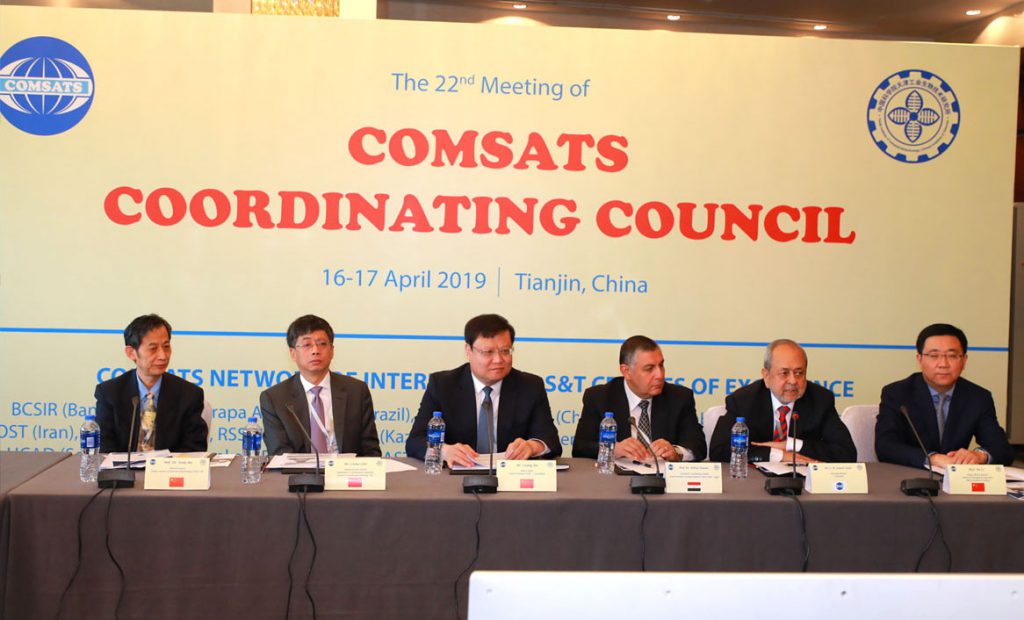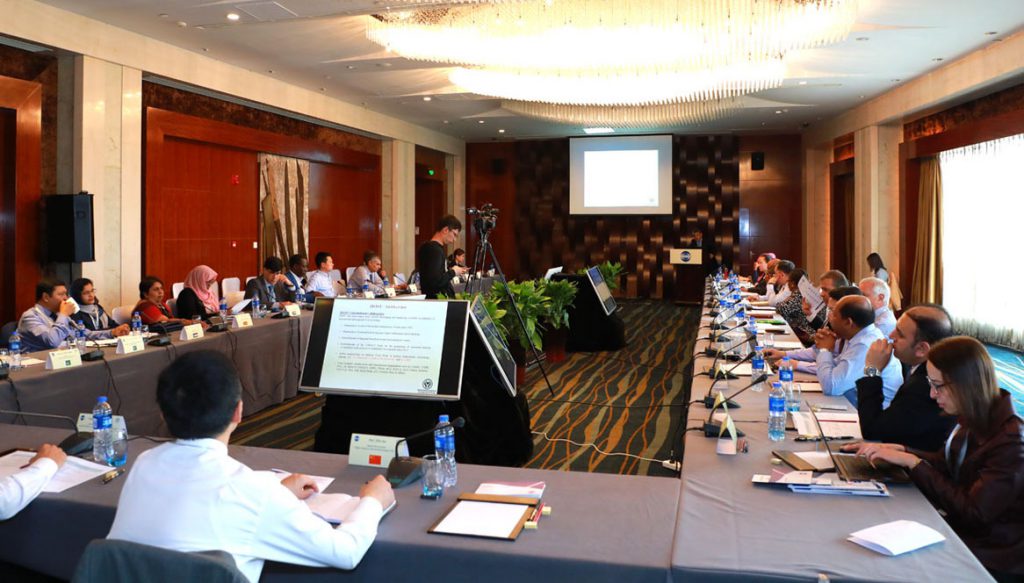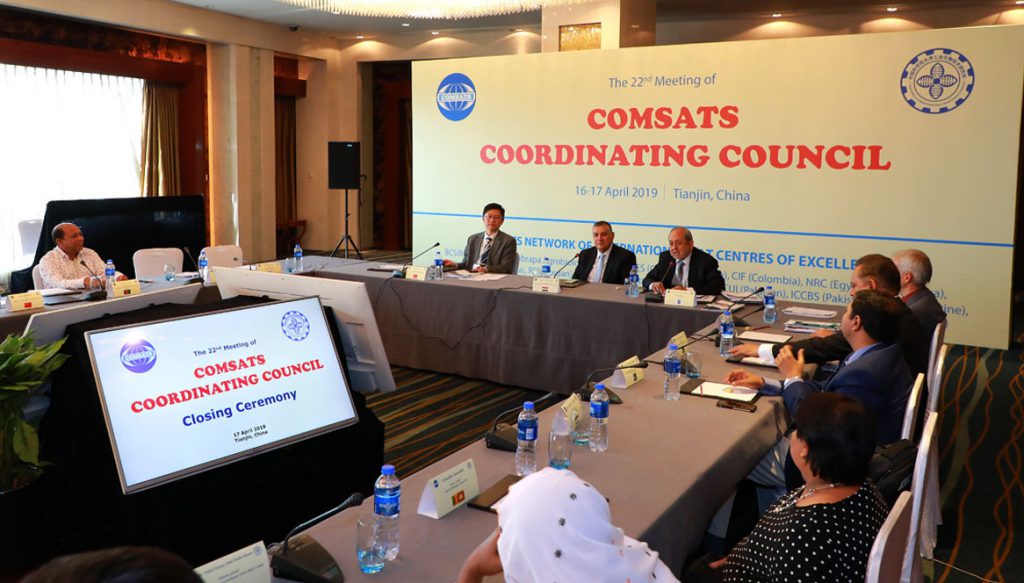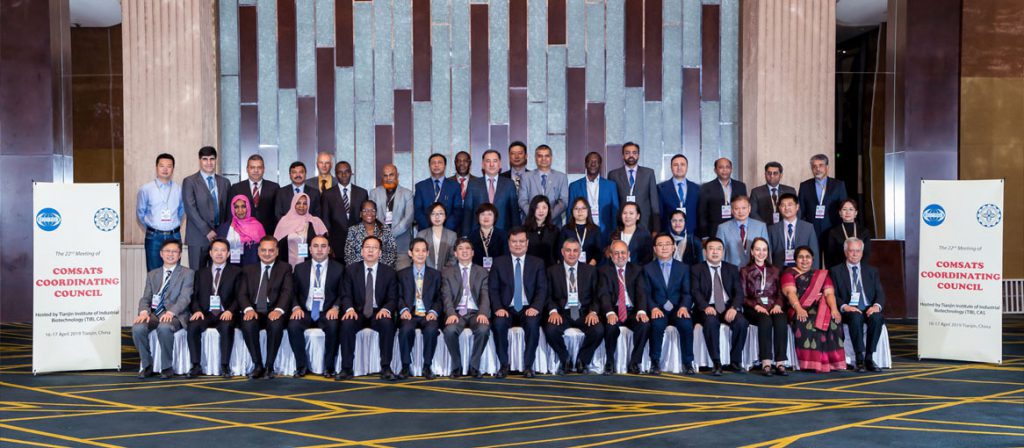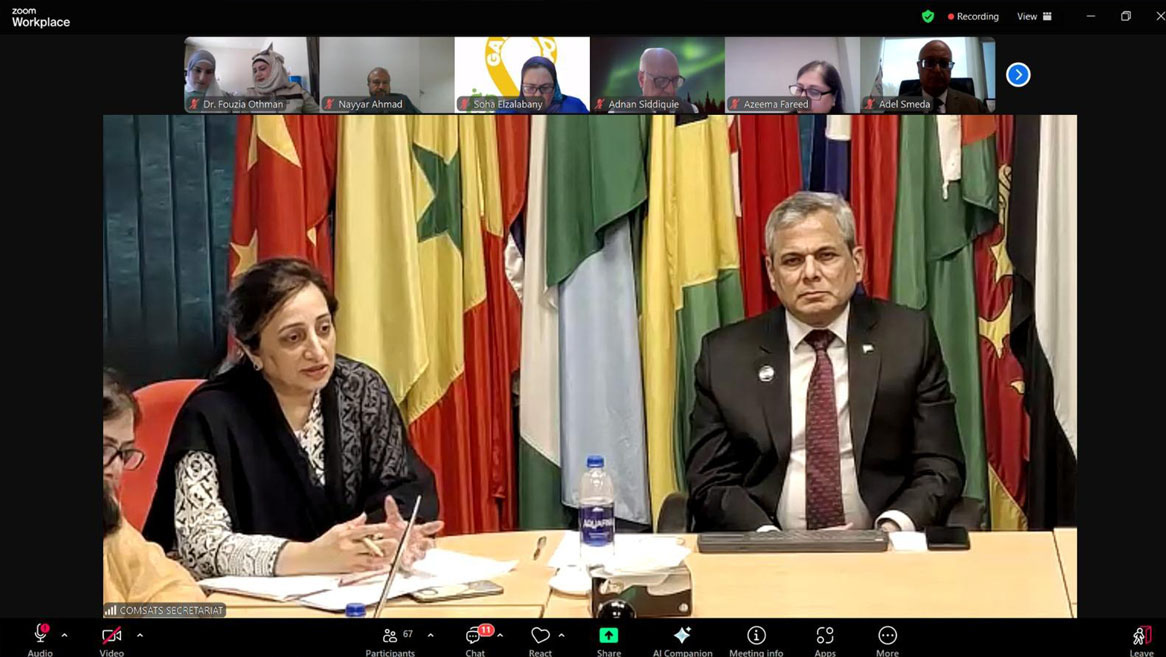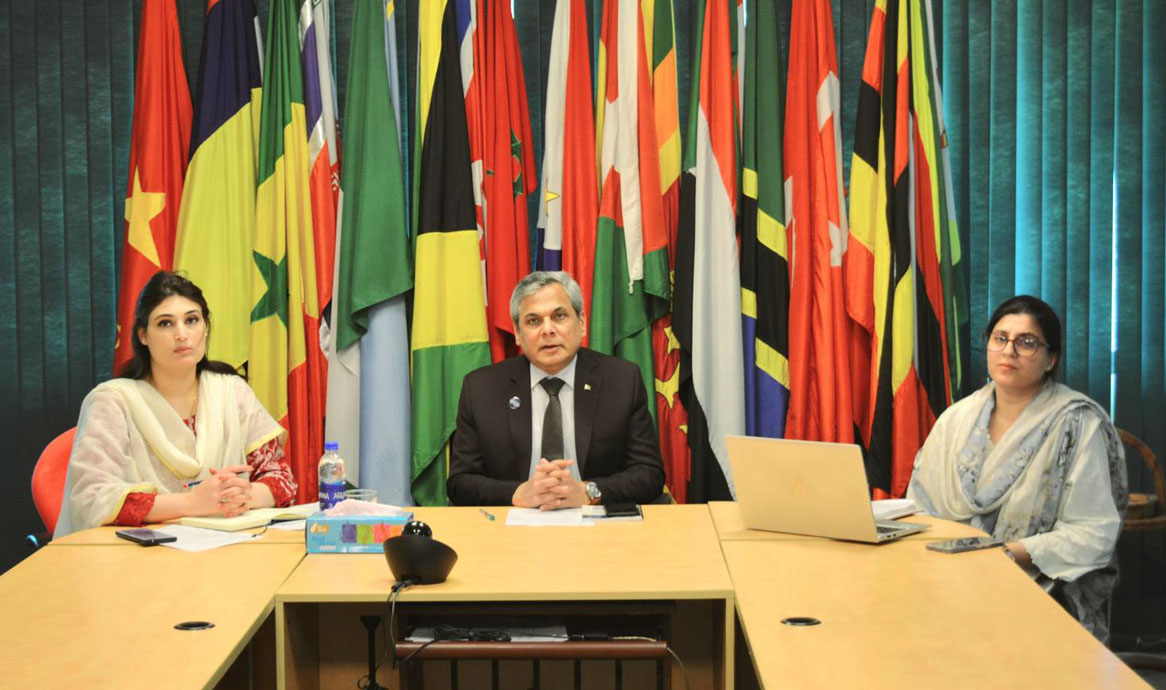[ Speeches ] [ Communiqué of the Meeting ] [ List of Participants ] [ Presentations ] [ Reports on ITRGs ]
The 22nd Meeting of COMSATS Coordinating Council was successfully held on 16-17 April 2019 in Tianjin, China. The meeting was hosted by COMSATS’ most recently inducted Centre of Excellence, the Tianjin Institute of Industrial Biotechnology (TIB), China.
The meeting was attended by the Council members or their representatives from 18 Centres of Excellence of COMSATS, including BCSIR (Bangladesh), ICCES (China), TIB (China), CIF (Colombia), NRC (Egypt), CSIR (Ghana), IROST (Iran), ICENS (Jamaica), KazNU (Kazakhstan), NMC (Nigeria), ICCBS (Pakistan), CUI (Pakistan), AQU (Palestine), ITI (Sri Lanka), IRCC (Sudan), HIAST (Syria), TIRDO (Tanzania), and TUBITAK MAM (Turkey). Two officials belonging to COMSATS’ international partner organizations i.e. TWAS and UNESCO, as well as a representative of diplomatic mission of Pakistan in China also attended the meeting as observers.
The event was inaugurated on the morning of 16th April 2019, by H.E. Laiying Yao, Vice Mayor of Tianjin Municipal Government, China. In addition to the Council members, representatives of international partner organizations and COMSATS’ officials, the inaugural ceremony was attended by the senior officials of Chinese Ministry of Science and Technology (MOST), Chinese Academy of Sciences (CAS), Chinese R&D organizations and universities, etc.
In his inaugural address, Mr. Laiying Yao stated that Innovation has increasingly become the most important and lasting driving force for economic growth. He added that with the deepening of economic globalization and more active transnational flow of innovation elements and resources, all countries of the world especially developing countries, should work for win-win cooperation through mutual learning. He told the participants that the Tianjin Municipal Government, in close cooperation with the Chinese Academy of Sciences (CAS), is relying on the National Technology Innovation Center for Synthetic Biology proposed and established by TIB to achieve a major breakthrough in synthetic biotechnology. Mr. Yao appreciated COMSATS for its outstanding contributions towards South-South cooperation, scientific and technological research and development, since its inception in 1994.
In his keynote address, Prof. Dr. Ashraf Shaalan, Chairperson COMSATS Coordinating Council, recalled that the essence of COMSATS’ foundation and activities is the promotion of South-South cooperation in the fields of science and technology for facilitating socio-economic uplift of developing countries. He stated that the efforts being made by COMSATS for promoting South-North-South Triangular Cooperation under the leadership of its current Executive Director are need of the hour. Speaking of his own Centre of Excellence, the National Research Centre (NRC), Egypt, Prof. Shaalan informed that NRC is actively working to implement the MoUs signed with other Centres of Excellence during the last Council meeting. He informed that NRC is ready for bilateral as well as multilateral cooperation from the platform of COMSATS. It was informed that being the Chairperson Coordinating Council, Prof. Shaalan is working closely with COMSATS Headquarters for facilitating capacity building and cooperative activities of the Centres of Excellence. He thanked TIB for making elegant arrangements for the meeting.
In his introductory remarks, Dr. S. M. Junaid Zaidi, Executive Direc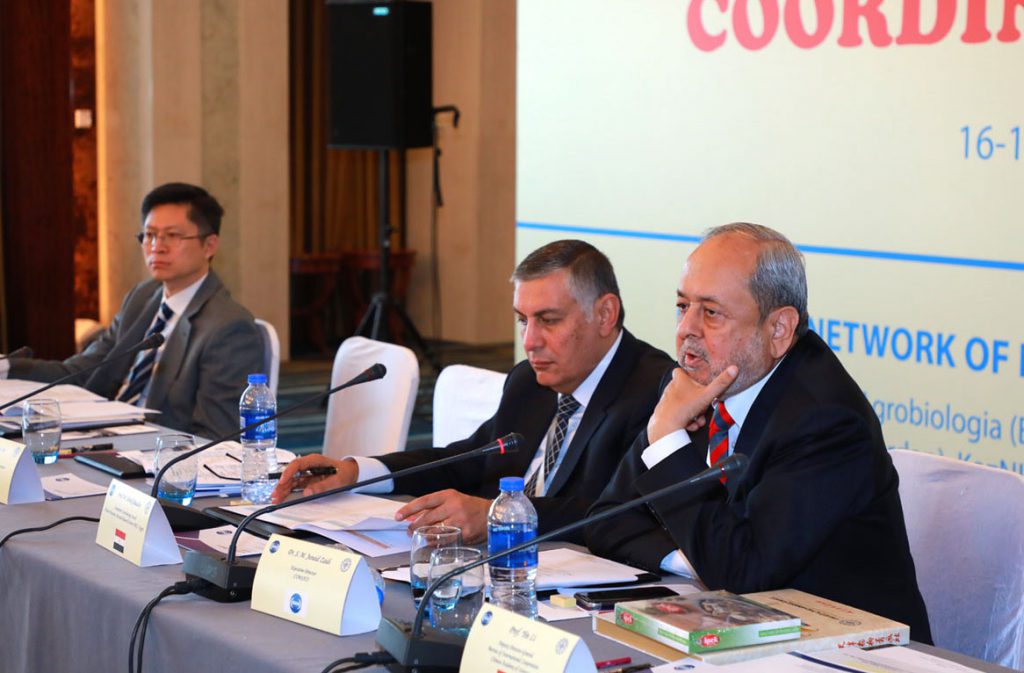 tor COMSATS, welcomed the participants and thanked the Chief Guest and other senior officials of Chinese government for sparing time to grace the ceremony with their presence. He paid gratitude to TIB for generous hospitality extended to foreign participants as well as excellent arrangements made for the meeting. Dr. Zaidi stressed the importance of Science, Technology and Innovation for socio-economic development of the countries of the South. He considered the Belt and Road Initiative (BRI) of China an extremely important initiative in this regard, and encouraged the Centres of Excellence to benefit from the opportunities it offers. He stated that effective South-South and Triangular Cooperation in the fields of science and technology can help in achieving Sustainable Development Goals (SDGs). Dr. Zaidi informed that COMSATS is looking to enhance its membership in order to extend its activities to all developing countries. He appreciated the South-South cooperation activities being conducted by the Centres of Excellence, and encouraged them to increase the number of joint projects and programmes for the benefit of the Member States.
tor COMSATS, welcomed the participants and thanked the Chief Guest and other senior officials of Chinese government for sparing time to grace the ceremony with their presence. He paid gratitude to TIB for generous hospitality extended to foreign participants as well as excellent arrangements made for the meeting. Dr. Zaidi stressed the importance of Science, Technology and Innovation for socio-economic development of the countries of the South. He considered the Belt and Road Initiative (BRI) of China an extremely important initiative in this regard, and encouraged the Centres of Excellence to benefit from the opportunities it offers. He stated that effective South-South and Triangular Cooperation in the fields of science and technology can help in achieving Sustainable Development Goals (SDGs). Dr. Zaidi informed that COMSATS is looking to enhance its membership in order to extend its activities to all developing countries. He appreciated the South-South cooperation activities being conducted by the Centres of Excellence, and encouraged them to increase the number of joint projects and programmes for the benefit of the Member States.
Earlier, in his opening remarks, Prof. Dr. Yanhe Ma, Director General, TIB, extended a warm welcome to the participants of the meeting, and expressed pleasure on hosting the Council meeting. He considered COMSATS a potent platform for facilitating the networking and scientific collaborations among the developing countries, and stated that the member countries can achieve the UN sustainable development goals by using the platform of COMSATS. He informed that TIB has established an office for COMSATS in order to strengthen the connections with Member States/Centres of Excellence and to promote its mission in China. He informed that TIB is planning to organize an international training course on industrial biotechnology during October 2019, in which COMSATS Member States will be invited to participate and benefit from the technologies and products developed by TIB. Prof. Ma also informed that TIB is developing the Technology Innovation Center for Synthetic Biology, which will provide a platform to COMSATS members for bilateral and multilateral collaboration in the related fields. He expressed willingness to initiate joint research projects in collaboration with other Centres of Excellence in the fields of synthetic biology for industrial bio-production, advanced microbial manufacturing, and advanced bioprocess engineering. Prof. Ma wished the participants a productive meeting and thanked the Ministry of Science and Technology of China for supporting and sponsoring the meeting.
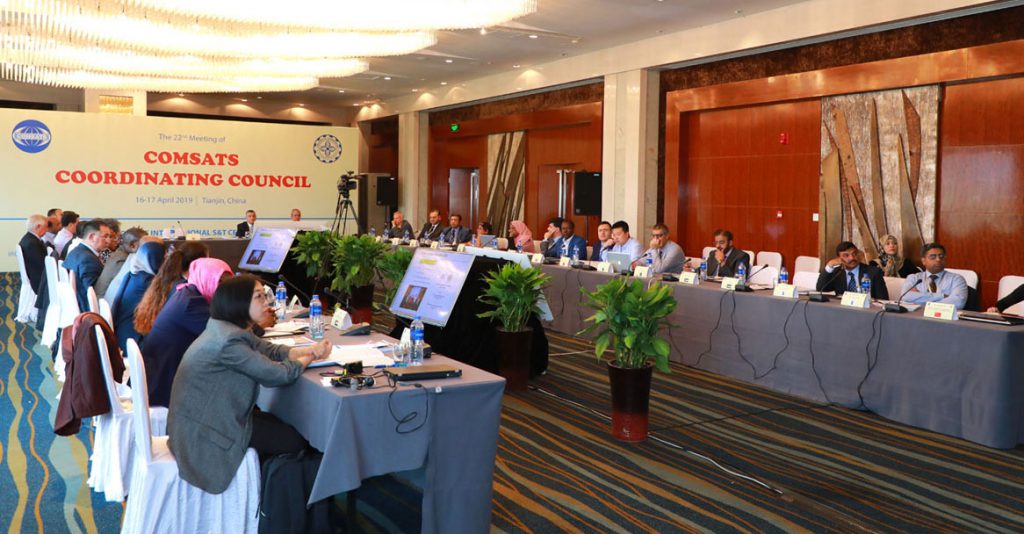
In his remarks, Mr. Linhao Chen, Deputy Director-General, Department of International Cooperation, Ministry of Science and Technology, China, recalled that the International Center for Climate and Environmental Sciences (ICCES), China, has been actively engaged in organizing and participating in COMSATS activities and it has been regularly coordinating a number of international projects under the framework of COMSATS, including the activities of COMSATS International Thematic Research Group (ITRG) on ‘Climate Change and Environmental Protection’. Subsequently, Mr. Chen made a presentation on China’s Action Plan for the Belt and Road Science, Technology and Innovation Cooperation, which consists of 4 actions: people-to-people exchanges, build joint laboratories, science park cooperation and technology transfer. In this connection, in next five years, China will host 2,500 young scientists for short-term scientific research, train 5,000 scientific, technical and management personnel, and establish 50 joint laboratories. He hoped that the member countries of COMSATS and the Centers of Excellence would benefit from these opportunities. He stated that China is willing to work with COMSATS member countries in the fields of mutual interest for ensuring a more prosperous future.
In his remarks, Dr. Yin Li, Deputy Director-General, Bureau of International Cooperation, Chinese Academy of Sciences (CAS), China, stated that CAS is honored to be a part of COMSATS’ community, and is willing to further strengthen the linkages with its programmes and activities. Dr. Li underscored the importance of Belt and Road Initiative by stating that this concept is based on cooperation, respect and friendship. In BRI project, science is a key to provide possible solutions to many of the common challenges, he added. Moreover, he told that CAS attaches great importance to international cooperation and closely works with partner organizations around the world, and appreciated COMSATS for its efforts towards promoting science-led sustainable development. Subsequently, Dr. Li made a presentation on establishment and activities of the Alliance of International Science Organizations (ANSO), which is an international S&T non-governmental organization and is the first International Science Forum of National Scientific Organizations on the Belt and Road Initiative. ANSO aims at promoting sustainable socio-economic development in the Belt and Road Region, and will be a platform for catalyzing regional and global collaborations in Science, Technology, Innovation and Capacity building. He added that ANSO shall facilitate in uniting the common scientific resources and wisdom in the grand mission of providing science-based inputs and assistance to support global, regional and national development.
During the technical sessions of the meeting, the Minutes of the previous (21st) Meeting of COMSATS Coordinating Council were approved by the Council. Subsequently, Mr. Farhan Ansari, Sr. Assistant Director (Programmes) COMSATS briefed the Council on the implementation status of the decisions taken by the Council in its previous meeting, while Dr. S. M. Junaid Zaidi, Executive Director COMSATS presented COMSATS’ Annual Activity Report (April 2018 – March 2019). The Coordinating Council expressed satisfaction on the implementation status of the decisions of last Council meeting, annual activity report (2018-19) and future plans.
The Heads/representatives of the Centres of Excellence made presentations on their activities related to South-South and Triangular Cooperation during last one year, including the ongoing interaction and collaboration with other Centres of Excellence, as well as future plans for COMSATS’ Network. The progress reports on COMSATS’ International Thematic Research Groups were also shared by the respective Lead Centres. The representatives of TWAS and UNESCO also made presentations, in which they highlighted the ongoing programmes and activities of their respective organizations as well as possibilities of support and collaboration with COMSATS.
A key decision taken during the meeting was the induction of Prof. Dr. Ashraf Shaalan (Egypt) as Honourary Lifetime Member of Coordinating Council, and his re-election as Chairperson Coordinating Council for another term of three years (2019 – 2022). Furthermore, the Scientific and Technological Research Council of Turkey (TUBITAK) was designated as COMSATS’ Centre of Excellence in place of TUBITAK Marmara Research Centre (MAM), Turkey. Due to this development, all of the research institutes under TUBITAK have come under the ambit of the Coordinating Council. The Council also appreciated the nomination of the Food and Nutrition Research Institute (FNRI) and Philippine Textile Research Institute (PTRI) by the Government of the Philippines for induction in COMSATS Network.
The Council was pleased to learn that COMSATS delegation led by Prof. Dr. Ashraf Shaalan (Chairperson Coordinating Council) had a productive meeting with the honourable Chairperson of COMSATS, President of Ghana, during which His Excellency’s guidance was sought regarding the ongoing and future activities of the organization. The Council also noted with appreciation the progress made regarding establishment of COMSATS Centre for Climate and Sustainability (CCCS). The Council was pleased to learn that eleven Member States have so far agreed to participate in the CCCS network and extend support for the success of this important initiative. The Council believed that CCCS will enhance capacity of COMSATS member countries as well as other developing countries in addressing challenges related to climate change that directly impact the areas of agriculture, water, heath, etc.
The Council appreciated the efforts being made by COMSATS to establish new Centres of Excellence and Universities in the Member States in the cutting-edge fields of science and technology for addressing their socio-economic needs. The Council members also deliberated upon the ongoing programmes of COMSATS, including Scholarships, Post-doctoral Fellowships, Tele-health Programme, capacity building activities, publications, etc. In this regard, the Council appreciated the standing offer of 100 postgraduate scholarships made by CUI-Pakistan; and the post-doctoral fellowships offered by NRC-Egypt, ICCBS-Pakistan and BCSIR-Bangladesh. The Centres of Excellence pledged to make use of these opportunities. The Lead Centres and collaborating institutions of ITRGs were encouraged to continue their research activities for the benefit of COMSATS’ Member States and may jointly submit project proposals to international donor agencies for seeking financial support for the projects.
Subsequently, Mr. Bilal Chohan, Director (A&E) COMSATS, presented the Administrative and Financial Matters of COMSATS, which were endorsed by the Coordinating Council. Moreover, the Council discussed matters related to financial sustainability of the organization and encouraged all Network members to sensitize their respective governments regarding the importance of regularly making annual membership contribution. The meeting also discussed matters related to the forthcoming meetings of COMSATS Consultative Committee and the General Meeting of the Commission.
It was decided that the next (23rd) meeting of the Coordinating Council will be hosted by the International Centre for Chemical and Biological Sciences (ICCBS), Karachi, Pakistan, during March/April 2020. The meeting issued a Communiqué which, inter alia, welcomed the Republic of Yemen as the 27th Member State of COMSATS and requested the country to nominate one of its renowned R&D organizations, for induction in COMSATS’ Network of Centres of Excellence. It also encouraged the Member Countries and Centres of Excellence to benefit from the opportunities available under China’s BRI.
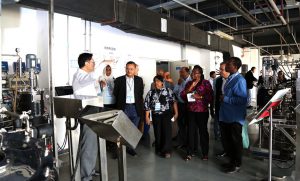
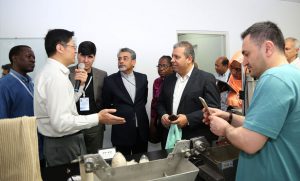
Speaking at the concluding ceremony, Prof. Dr. Jibin Sun, Deputy Director General, TIB, expressed pleasure on successfully hosting the meeting, and thanked the participants for their active interventions. He looked forward to TIB’s practical collaboration with other Centres. Prof. Ashraf Shaalan, Chairperson Coordinating Council, thanked TIB for hosting the meeting. He pledged to closely work with COMSATS Headquarters for achieving the objectives of COMSATS Network. Speaking on the occasion, Dr. S. M. Junaid Zaidi, Executive Director COMSATS, thanked TIB for excellent arrangements for the meeting. He congratulated Prof. Shaalan on his re-election as Chairperson Coordinating Council, and for befittingly steering the deliberations during the meeting. He stated that COMSATS Headquarters would make all efforts to facilitate mutually beneficial collaboration among the Network members.The participants of the Council meeting visited the laboratories of TIB on the morning of 18th April 2019. In this regard, Prof. Jibin Sun gave introduction to the laboratories and facilities which includes: National Engineering Laboratory for Industrial Enzymes; Laboratory of Systems Microbial Biotechnology; Laboratory for Industrial Biological Systems and Bioprocessing Engineering; and Tianjin Engineering Center for Biocatalytic Technology. Some presentations were made by TIB’s Professors to show the impact made by TIB for sustainable development of China. The visitors took great interest in the technologies and products developed by TIB, and had in-depth exchanges with the scientists of the institute. Participants expressed their hope to further strengthen communication and exchanges with TIB and promote bilateral and multilateral cooperation among COMSATS member states in the field of biotechnology.
Speeches
- Welcome Address by Prof. Dr. Yanhe Ma, Director General, Tianjin Institute of Industrial Biotechnology (TIB), China
- Introductory Remarks by Dr. S. M. Junaid Zaidi, Executive Director COMSATS
- Remarks by Mr. Yin Li, Deputy Director General, Bureau of International Cooperation, Chinese Academy of Sciences
- Inaugural Address by Mr. Linhao Chen, Deputy Director General, Department of International Cooperation, Ministry of Science and Technology, China
- Inaugural Address by Mr. Laiying Yao, Vice Mayor of Tianjin Municipal Government
Presentations
- Bangladesh Council of Scientific & Industrial Research (BCSIR), Bangladesh
- International Center for Climate and Environment Sciences (ICCES), China
- Tianjin Institute of Industrial Biotechnology (TIB), China
- Centro Internacional de Fisica (CIF), Colombia
- National Research Centre (NRC), Egypt
- Council for Scientific and Industrial Research (CSIR), Ghana
- Iranian Research Organization for Science & Technology (IROST), Iran
- International Centre for Environmental and Nuclear Sciences (ICENS), Jamaica
- Al-Farabi Kazakh National University (KazNU), Kazakhstan
- National Mathematical Centre (NMC), Nigeria
- COMSATS University Islamabad (CUI), Pakistan
- International Center for Chemical and Biological Sciences (ICCBS), Pakistan
- Al-Quds University, Palestine
- Industrial Technology Institute (ITI), Sri Lanka
- Industrial Research and Consultancy Centre (IRCC), Sudan
- Higher Institute for Applied Science and Technology (HIAST), Syria
- Tanzania Industrial Research and Development Organization (TIRDO), Tanzania
- TÜBİTAK Marmara Research Center (MAM), Turkey
Other Presentations
- The World Academy of Sciences (TWAS)
- United Nations Educational, Scientific and Cultural Organization (UNESCO)

